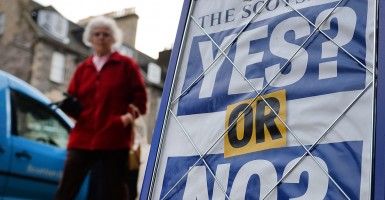Scots go to the polls Thursday to decide whether to continue life within the United Kingdom or as an independent country. That is their choice and they have the right to make it without outside interference. But they also have a right to make an educated decision.
So how could Scotland’s decision influence its relations with other nations?
Perhaps most importantly, would Scotland be able to join two of the main organizations to which she’s now a party through the UK: the North Atlantic Treaty Organization and the European Union?
Ask pro-independents Scots and they usually say, “we’re already in the EU and NATO.” Yes, but the minute they become independent they are out, and must reapply.
The President of the EU Commission, Jose Manuel Durao Barrosso, the highest official in that body, has been crystal clear on the matter of EU membership: not only would an independent Scotland have to reapply to join the EU, but “it would be extremely difficult, if not impossible” for Scotland to join, as Spain would veto its application.
The reason is that Spain has its own restive regions where some nationalists seek independence, especially Catalonia and the Basque Country, and will do anything to discourage its own dismemberment.
As for NATO, I spoke today with the George W. Bush administration’s last ambassador to NATO, Kurt Volker, and he was equally clear. As with the EU, NATO admission must be unanimous, and the Scottish National Party’s promise that it would make an independent Scotland “nuclear free” would bar it from entry.
Nuclear free means that Scotland would not let Allied submarines or ships with nuclear weapons enter its waters. The NATO alliance has however assiduously kept to a “neither confirm nor deny” policy under which it refuses to acknowledge whether the vessels carry nukes.
“If Scotland becomes independent, it will have to reapply to join NATO,” said Volker. “NATO makes decisions on acceptance of new members by consensus. Every country that joined NATO has had to sign up to all NATO policies and doctrines, the integrated structure and so forth–and the nuclear policy. The heart of NATO’s nuclear policy is shared responsibility — even though only a few members have nuclear weapons or host them, every member shares responsibility for supporting the effectiveness of NATO’s nuclear deterrent.”
What would happen, said Volker, is that “after Scotland applied to join NATO, members would discuss its application and I would expect that several members, the U.S. among them, would reject a new member that didn’t commit to adhere to NATO’s nuclear policies. We have never accepted a new member that didn’t accept our nuclear policies.”
Of course, it would be better if Spain and other EU countries with restive regions, such as Italy, spoke clearly about whether they intend to veto a Scottish EU membership. The Spanish government of Prime Minister Mariano Rajoy has a golden opportunity tomorrow in the Spanish Parliament, where the pro-independence Basque Nationalist Party (PNV in Spanish) is already preparing to ask Rajoy what he intends to do. The time to speak clearly is now, not after the Scots vote.
And the same goes for the Obama administration, which as much as it likes to deny it, still leads the free world. The anchor of that leadership is NATO. Will the Obama administration veto a membership by a nuclear-free Scotland that bars ships with nukes?
It’s a good question, too for any presidential aspirants in 2016, as they may be the ones who will have to make that decision.
Scotland is very well-liked in this country, where millions proudly claim Scottish roots.. But it difficult to see how a dismembered United Kingdom, which is after all our best ally—again, whether President Obama likes to admit it or not—is at all in the U.S. national interest.































